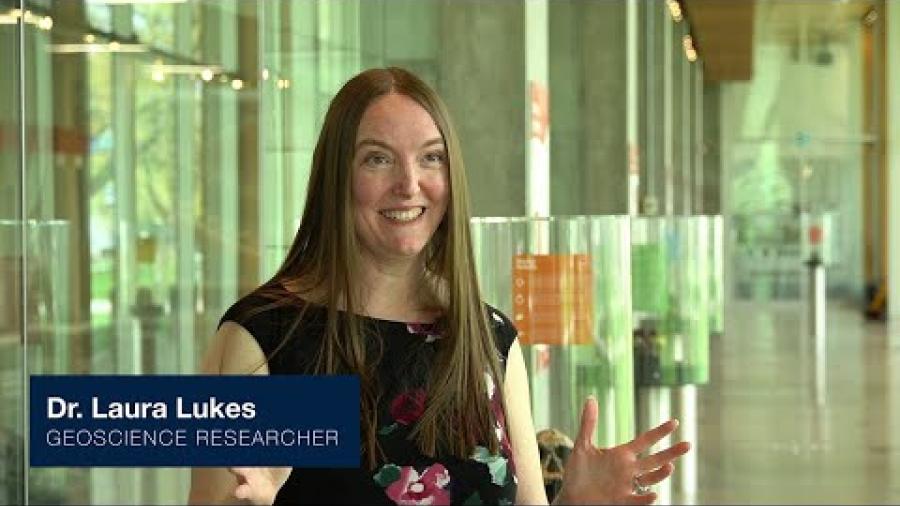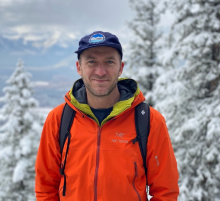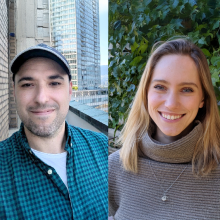
“One of the reasons why I really wanted to come to UBC was the culture that recognizes the importance of understanding how people learn and become professionals within a discipline,” says Dr. Laura Lukes, a new assistant professor with UBC EOAS. “If we understand how people make choices about STEM learning experiences, we can better prepare the geoscience workforce to solve the complex Earth challenges humans face.”
For Dr. Lukes, much of that passion stems from her interests at the intersection of geology and psychology, which have guided her professional path through locales as diverse as the oil fields of California, the Greenland ice sheet, and now, the Lower Mainland of B.C.
After master’s degrees in both geology and education, experience in industry and time teaching at the secondary and community college levels, Dr. Lukes was awarded an Albert Einstein Distinguished Educator fellowship. It was a transformative experience—she served her fellowship as the director of a project led through the U.S. National Science Foundation which took students and teachers onto the Greenland ice sheet to do research in collaborative international teams.
“The advice I got was, if I wanted to continue creating that type of programming and continue working on issues on international data sovereignty and Indigenous sovereignty, I needed to get my PhD.”
That led Dr. Lukes to North Carolina State University where she merged geology and education into a dissertation on self-regulated learning that earned her a PhD in Marine, Earth and Atmospheric Sciences.
Learning on the land
One of Dr. Lukes’ interests is how to better prepare students for field experiences. She’s a strong advocate of field-based learning and cites the UBC-TECK Geological Field School in the South Okanagan as a fantastic experience for EOAS students.
“Learning on the land can be such a transformative experience because you're connecting with it in many different ways rather than just reading about it. The community building that happens in field environments is very different than in a classroom. People need to collaborate and navigate the social space in a different way. The field school is a place for students to come back to after a day in the field to reflect and process their experiences.”
As well as in situ learning, Dr. Lukes also studies how people learn in museums, where the public’s understanding and appreciation of science can be developed. Now that museums are opening up after pandemic-induced closures, she says that parents are quite thrilled to have spaces available for their kids to explore and get together.
“Parents’ motivation to bring their kids to a museum may be so that the kids can run around and do something for an hour, but while they're there, how are the parents’ perspectives about STEM being transformed just by being in that space? There's a great opportunity to spark new interest in that next generation.”
To that end Dr. Lukes is developing a course in museum and science centre settings where graduate students can create exhibits and programming—and develop their communications skills with the public.
“Communication is essential for scientists,” she says. “In order for discoveries to have an impact, you need to be able to communicate them. If people don't have an understanding or appreciation of how science impacts their lives, then the support won’t be there for future research that could lead to new discoveries that could impact the world.”
Integrating Western and Indigenous science paradigms
As UBC Science explores ways to integrate Western and Indigenous science within its curricula, Dr. Lukes, in collaboration with Dr. Shandin Pete, is developing questionnaires, surveys and interview protocols to determine EOAS student perspectives on how to best merge the paradigms.
“The students have lots of questions and they're very eager and interested about how it relates to their professionalism. For instance, how do non-Indigenous students build relationships and embody community engaged principles in their work? How can they acknowledge data sovereignty and Indigenous rights in a professional paper? There's not a class in their science degree programs that teaches you that.”
“Everybody's in their own learning journey. And everybody has a role and responsibility to work towards this. So how can we all work together in a good way moving forward? That’s what we’re trying to figure out.”
Related Links:
Dr. Laura Luke's faculty profile at UBC Earth, Ocean and Atmospheric Sciences


